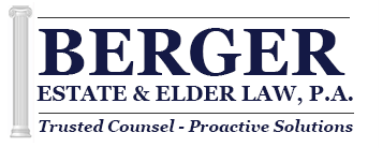|
|
Frequently Asked QuestionsEstate & Elder Law services can seem overwhelming and complicated. We are here to help make the complex simpler for you and your family. Below are a few of our frequently asked questions. If you still can't find an answer to your question here, please don't hesitate to reach out to us at (913) 491-6332, or email us at info@berger-lawfirm.com.
WHAT DOES PROBATE MEAN? - The Probate Court handles the affairs of persons who cannot represent themselves. This includes minor, elderly or disabled persons called “wards” and deceased persons. The Probate Court appoints and monitors guardians and conservators. It also protects the rights of heirs and creditors and assures the orderly transfer of a decedent’s property.
WHAT IS A GUARDIAN? - Person appointed by the Probate Court to make personal and medical decisions for a ward. WHAT IS A CONSERVATOR? - Person appointed by the Probate Court to handle the financial affairs of a ward. WHAT IS A POWER OF ATTORNEY? - A Power of Attorney is a legal instrument by which one person, the principal, authorizes another, the agent, to act on the principal’s behalf regarding financial or medical decisions. The authority the principal gives the agent can be very broad or it can be limited to one or two specific acts. It will be called Durable if it continues to be effective even after the principal has lost capacity due to illness or injury. WHAT IS A LIVING WILL? - A Living Will, also called a Health Care Treatment Directive, is a written declaration instructing your physician to withhold or withdraw life-prolonging measures in the event of a terminal condition. This document may be relied upon by your physician even if you are unable to communicate your decisions. WHAT IS A DO NOT RESUSCITATE ORDER (DNR)? - A written physician’s order that protects the patient from unwanted emergency measures such as cardiopulmonary resuscitation. WHAT IS A WILL? - A will is the legal expression of a person’s instructions for the disposition of property and parental responsibilities to be performed after death. It is a written instrument that is executed according to strict legal formalities. WHAT IS A TESTATOR? - A Testator is the person who dies leaving a will. WHAT IS AN EXECUTOR? - An Executor is a person appointed by a testator in a will to dispose of property and carry out intentions as expressed in the will after death. WHAT IS AN ADMINISTRATOR? - An Administrator is a person appointed by the Court to act as personal representative if the decedent did not name an executor in a will, or if a person dies without a will. WHAT IS A TRUST? - A Trust is a three party instrument whereby property is held by one person for the benefit of another. The holder of the property has a very strict obligation to manage the trust property in accord with high ethical standards, and in accord with all terms set forth by the person who established the trust. A trust can be created for any legal purpose. Examples of trust purposes include: taking care of minor children, providing for children’s educational expenses, supporting charities and minimizing taxes. The “Beneficiary” of a trust can be any person or organization, including the person who establishes the trust. The person funding the trust may be called: The Grantor, Trustor, Settlor, Donor or Creator. The person controlling the property is called the Trustee. The person who benefits from the trust is called the Beneficiary. WHAT IS A TESTAMENTARY TRUST? - A Testamentary Trust is created at death according to the terms of a valid will. The will must be probated and the estate administered before the trust comes into existence. WHAT IS A LIVING TRUST? - A Living Trust is typically a revocable document established during a person’s lifetime, for investment management, future self-protection in the event of incapacity and estate planning purposes. A living trust can continue after a person’s lifetime to benefit others without the delays and expenses of probate. While a living trust initially costs more than a will to set up, its lifetime benefits and probate cost savings make it a popular estate planning tool. WHAT IS THE COST? - We are in the legal profession because we want to help people. Because we are a private business enterprise we can only help those people who become our clients. We make every effort to insure that the value of our services to you, our client, exceeds the fees that we charge. Abraham Lincoln once said, "A lawyer's stock in trade is his time and talent." We have to charge for our time and talent to stay in business. Wherever possible we provide services on a fixed fee basis. These fees will be quoted in advance of the services being performed Not all matters can be done on a fixed fee basis. With some matters, such as probate proceedings, contract negotiations, litigation, etc., it is just not possible to know in advance how complex or time consuming the work will become. In these matters, we can only assure you that we will do the best job possible, and will keep you informed of our progress. These services will be charged for on a time and expense basis. The hourly charge will vary depending on which member of our staff performs the services. Every effort will be made to keep your fees to a minimum. Still have questions? |
| Contact Us Today! (913) 491-6332 info@berger-lawfirm.com 11233 Nall, Suite 140 Leawood, KS 66211 |
